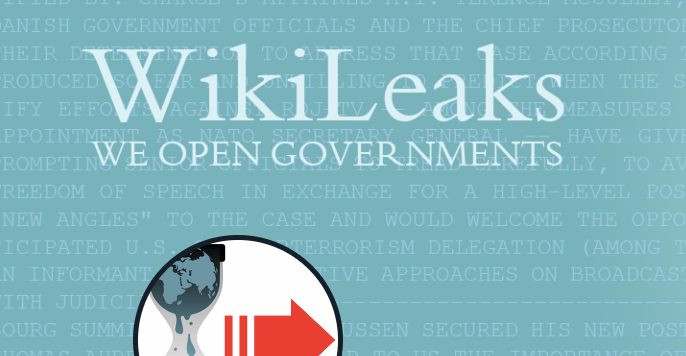The links are available in the original article
Twitter
Locks @WikiLeaks And Multiple WikiLeaks Staff Accounts
Caitlin
Johnstone

20
December, 2018
WikiLeaks
staff are unable to access or post from the organization’s primary
Twitter account or other accounts used by its staff and legal team,
according to WikiLeaks editor-in-chief Kristinn Hrafnsson.
“These
accounts are locked @wikileaks @assangedefence @wltaskforce
@assangelegal and cannot be accessed,” Hrafnsson recently tweeted.
“They also seem to have been shadow banned. Should we be worried in
these critical times?”
“To
clarify, these accounts cannot be accessed and new tweets posted,”
Hrafnsson added. “Attempts to get this fixed through normal
methods, when tech error have happened, have not worked. No replies
to DM´s addressed to people who should be worried that accounts with
6 mill followers are frozen.”
These accounts are locked @wikileaks @assangedefence @wltaskforce @assangelegal and cannot be accessed. They also seem to have been shadow banned. Should we be worried in these critical times?
The
primary WikiLeaks Twitter account has 5.4 million followers and for
years has been the primary means by which the organization has made
public announcements, going so far as to say it is the only account
authorized to make statements on behalf of WikiLeaks. The Assange
Defence account, which is run by the legal campaign to free its
founder Julian Assange from arbitrary detention and persecution, has
747,000 followers. The WikiLeaks Task Force account, which has been
used to correct disinformation and combat corporate media smears
about WikiLeaks, has 142,000 followers. The @AssangeLegal account,
the account of justice4assange editor Hanna Jonasson, has 12,000
followers. All four of these accounts have per Hrafnsson been locked
to prevent the use of those platforms and shadow banned.
Now,
Twitter has claimed that it does not engage in shadow banning as a
practice, but its denial took the form of redefining shadow banning
to mean “deliberately making someone’s content undiscoverable to
everyone except the person who posted it, unbeknownst to the original
poster,” while acknowledging that in order to find a blacklisted
account’s content “you may have to do more work to find them,
like go directly to their profile,” which is what most people mean
when they talk about shadow banning on Twitter. When asked about
shadow banning, Twitter CEO Jack Dorsey let loose an nonsensical word
salad somewhere along the lines of “Well I think the statements
behind the statement and the question behind the question is the me
behind the me and the you behind the you and it’s a blibba blabba
zim zam hey look over there.”
"We do not look at content with regards to political viewpoint or ideology," @Jack told me. But he knows some people do not believe him. "I think we need to constantly show that we are not adding our own bias, which I fully admit is left, is more left-leaning," he says...
0:01 / 2:08
Video
See more at cnn.com
It
is worth noting here that Dorsey has an established record of lying
to Twitter users about the social media outlet’s censorship
practices. In the lead-up to the 2016 election, Twitter CEO Jack
Dorsey was asked point-blank if Twitter was obstructing the #DNCLeaks
from trending, a hashtag people were using to build awareness of the
DNC emails which had just been published by WikiLeaks, and Dorsey
flatly denied it. More than a year later, we learned from a prepared
testimony before the Senate Subcommittee on Crime and Terrorism by
Twitter’s acting general counsel Sean J. Edgett that this was
completely false and Twitter had indeed been doing exactly that to
protect the interests of US political structures by sheltering the
public from information allegedly gathered by Russian hackers.
And
indeed, @wikileaks, @assangedefence, @wltaskforce, and @assangelegal
are as of this writing so aggressively shadow banned that an advanced
search for tweets by those accounts turns up not one single post by
any of them.
Even
if Twitter does end up restoring access to all or some of these
accounts, the fact that the site would shut them down at all is
deeply disturbing. A massive Silicon Valley giant’s willingness to
operate as an extension of the national security state to an even
limited extent does not say good things about the future of free
information access.
So
in answer to Hrafnsson’s question “Should we be worried in these
critical times?”, I think the answer is yes. Twitter has already
actively helped shrink WikiLeaks’ voice and facilitated fake
accounts and disinformation by refusing to verify the account of
Julian Assange back when he had unrestricted internet access, and it
appears to now be censoring the entire organization. At a time when
the Trump administration is known to be pursuing Assange’s arrest,
at a time when the now-Secretary of State has waged a war on
WikiLeaks, at a time when narrative control has become a primary
focus of the ruling power establishment as the US and its allies
hurtle toward a military confrontation with Russia and/or China, yes,
we should be worried. Very worried indeed.
_____________________
The
best way to get around the internet censors and make sure you see the
stuff I publish is to subscribe to the mailing list for my website,
which will get you an email notification for everything I publish. My
articles are entirely reader-supported, so if you enjoyed this piece
please consider sharing it around, liking me on Facebook, following
my antics on Twitter, throwing some money into my hat on Patreon or
Paypal, purchasing some of my sweet new merchandise, buying my new
book Rogue Nation: Psychonautical Adventures With Caitlin Johnstone,
or my previous book Woke: A Field Guide for Utopia Preppers.



No comments:
Post a Comment
Note: only a member of this blog may post a comment.